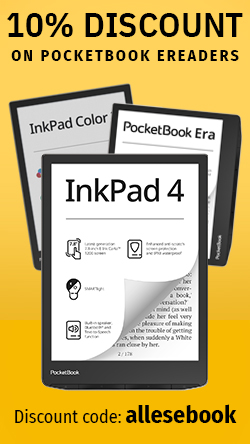Growth of the German eBook Market and Online Book Sales: New Insights and Trends
Several weeks ago, we reported that the German eBook market had grown more than expected in 2012. Media Control had reported a market share of around 2 percent at that time. A new study by the Börsenverein in collaboration with GfK now indicates a market share of 2.4 percent in the consumer market. This represents a tripling of the share from 2011, which was at 0.8 percent. In 2010 it was still 0.5 percent.
eBook Revenues of Publishers Significantly Increase
The revenue figures from publishers are particularly interesting. From a survey of 361 publishers, eBook revenue was reported to average 9.5 percent of total revenue. In 2011, the share was only 6.2 percent, and in 2010 it was 5.4 percent. These revenue increases with eBooks are having an impact, as the share of publishers leading in eBooks continues to rise steadily, with 53 percent now including eBooks in their programs for the first time, which is over half of the publishers. Overall, 84 percent of publishers currently plan to offer eBooks.
New releases remain highly popular, while backlists receive significantly less attention. Thus, 54 percent of printed new releases are also available as eBooks, while only 29 percent of the backlist titles are.
Brick-and-Mortar Bookstores Left Behind?
It’s not surprising that book sales on the Internet continue to rise (+ 10.4 percent) and now account for 16.5 percent. This is problematic for brick-and-mortar bookstores without an online shop, whose revenues have been steadily declining for 3 years (2012: -3.7 percent). There is no end in sight to this trend. Additionally, the shift to eBooks proves to be a double-edged sword for bookstores. On one hand, they don’t want to lose their footing, but on the other, eBook readers are hardly noticed there.
In December 2012, 70 percent of bookstores selling eBook readers sold on average no more than five devices throughout the entire month. This is reflected in the revenue share of eBooks in brick-and-mortar bookstores, which remains at only 0.5 percent.
This naturally puts them in a dilemma, as they are losing out to the “normal” online book trade and to the eBook market (which often go hand in hand). Ultimately, the expectations of the retailers show that they are all too aware of this fact. In 2011, they expected an eBook sales share of 9.2 percent, but for 2013, it’s down to just 3.2 percent. However, the share of retailers dealing in eBooks (and eBook readers) continues to rise. In 2011, it was only 32 percent, but now it has climbed to 73 percent. Only 14 percent plan to continue without eBooks and eBook readers. 57 percent of bookstores anticipate a 16 percent decline in traditional assortments by 2015.
Where Are the Sales Heading?
Given the rather bleak figures in physical bookstores, one has to wonder where the internet and eBook sales are going. This can be answered quite easily: to the big retailers. Estimates assume that 18 to 20 percent (1.6 to 1.8 billion euros in revenue) of the German book market now goes to Amazon. Weltbild and Hugendubel account for 1.56 billion euros, and Thalia for 915 million euros. The entire German book industry had an estimated turnover of 9.52 billion euros in 2012.
Amazon continues to be seen as the main competitor by the local book trade, as their strategy in the eBook sector pays off in multiple ways. On one hand, they grow through the “normal” online book trade, while on the other, they create an environment with the Kindle ecosystem that makes entry easy but switching to other platforms difficult. Once a customer chooses Kindle, switching to the open ePub format is not easy, as the eBooks purchased from Amazon cannot be legally transferred. Additionally, Amazon is active on other fronts, offering a crucial platform for independent authors to publish their works, who also serve as multipliers for Kindle marketing.
While Amazon had to deal with a public image setback over recent months due to the temp worker documentary, opinions differ on how severe the damage actually is. At the same time, Amazon seizes every opportunity to regain customer favor. In the past months, there have been price reductions on various Kindle models for almost every special occasion (Easter, Valentine’s Day, Mother’s & Father’s Day, etc.). Recently, the base model Kindle NT’s price was reduced by 10 euros to 69 euros. Just a few days ago, Amazon also launched an advertising campaign focusing on the Kindle.
Outlook for 2013
For 2013, a further significant growth in the eBook market is widely expected. However, predicting the exact extent of this growth is difficult, as past growth forecasts have all been off the mark. In any case, this year’s Christmas business will be of particular interest to all parties involved. Weltbild, Hugendubel, and Thalia are better positioned than ever thanks to the Tolino Shine, but Amazon also intends to offer particularly strong purchasing incentives this year (judging by the many temporary price reductions).
Moreover, don’t forget about the Libri brand eBook.de, which has positioned itself even more clearly than the competition with last year’s relaunch. In 2012, they achieved an eBook share of 53 percent of their total revenue, more than any other major retailer.
In any event, an exciting Christmas season is ahead for customers.
You can find the complete press kit, including the survey results, on the Börsenverein’s website.

